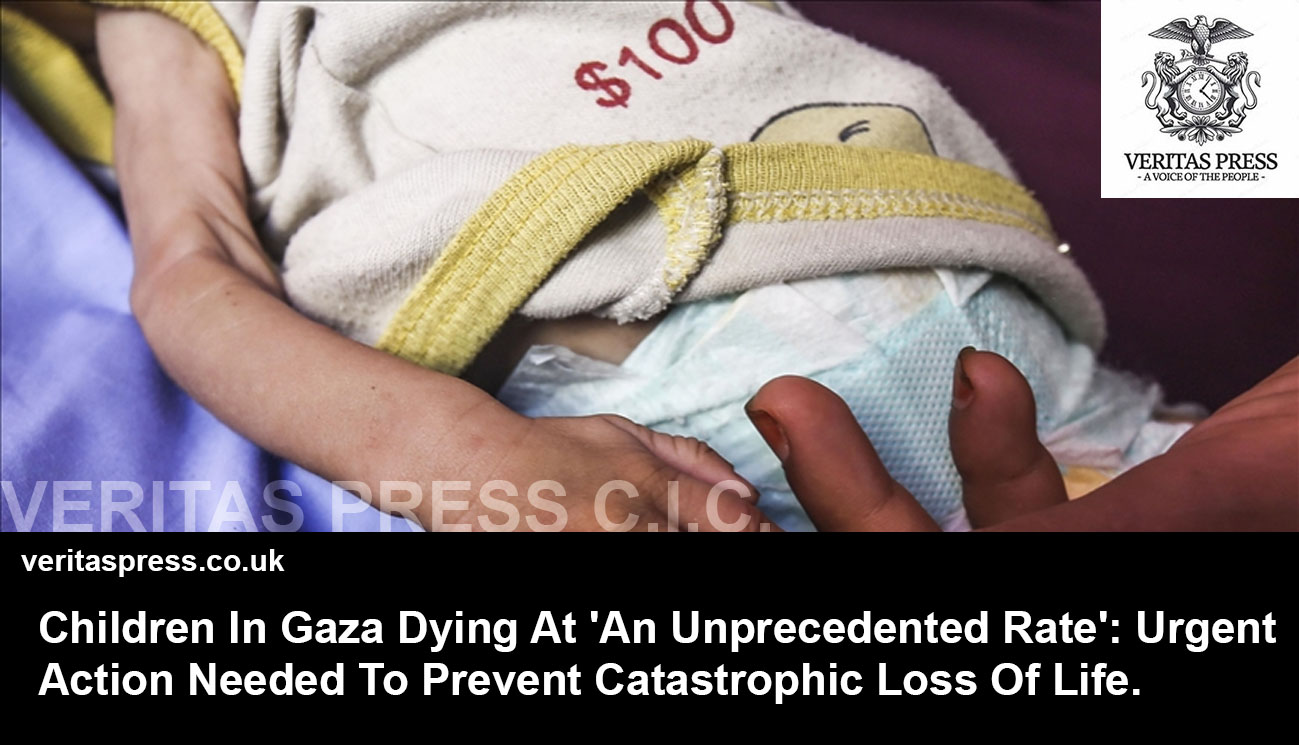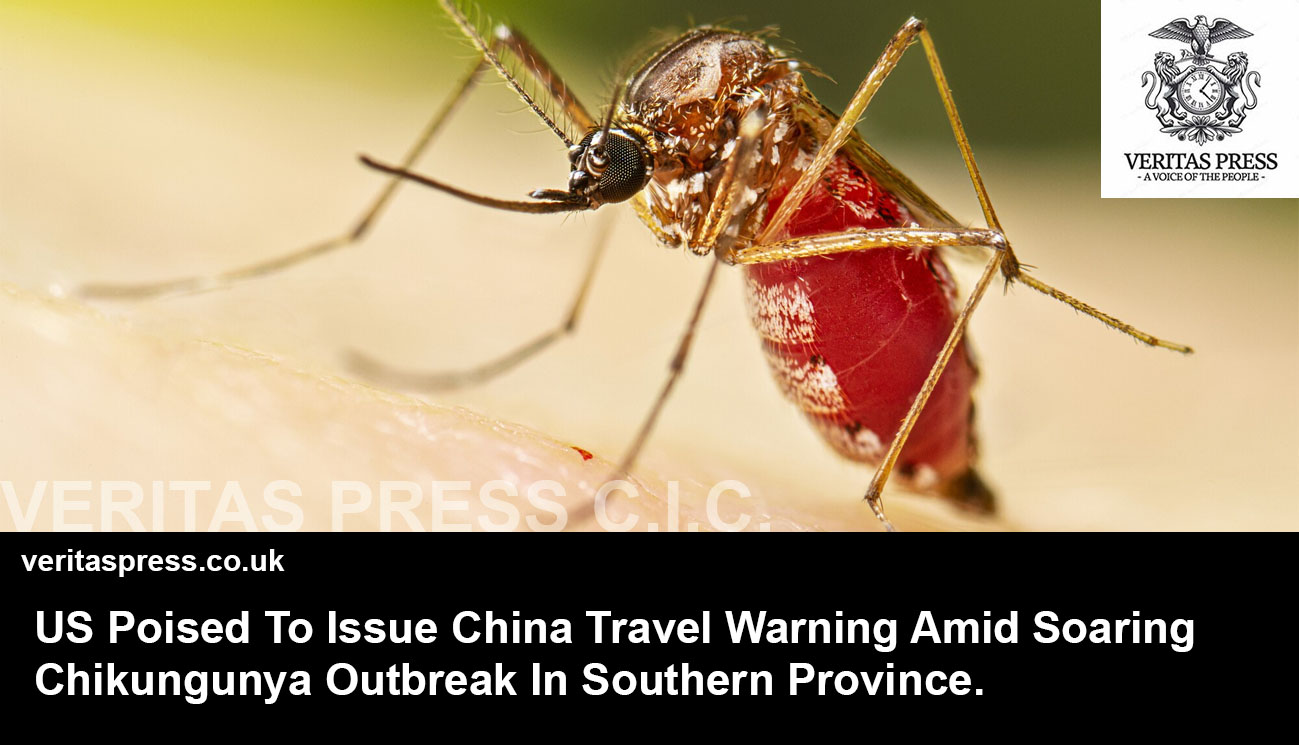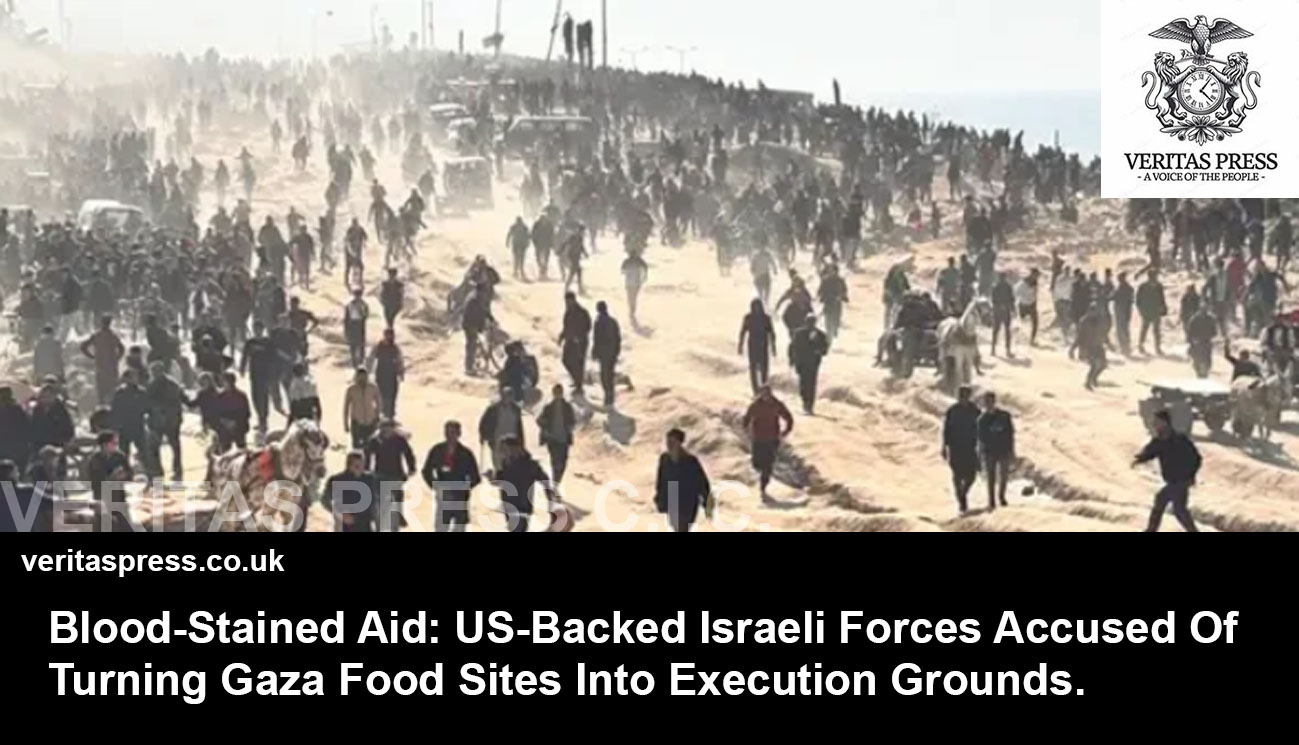Press Release: Veritas Press C.I.C.
Author: Kamran Faqir
Article Date Published: 01 Aug 2025 at 19:42 GMT
Category: Middle East | Palestine-Gaza | US-Israel At War
Source(s): Veritas Press C.I.C. | Multi News Agencies
UNICEF and Global Humanitarian Experts Sound the Alarm Over Growing Child Mortality in Gaza
In a stark and heart-wrenching appeal to the international community, UNICEF has warned that children in Gaza are dying at an “unprecedented rate” as a result of Israel’s ongoing military operations, which have devastated the region since October 2023. The situation has reached an emergency threshold, with over 18,000 children reported dead and more at risk from hunger, disease, and the collapse of basic infrastructure.
“We are at a crossroads,” said Ted Chaiban, UNICEF’s Deputy Executive Director, during a briefing on his recent visit to the Middle East. “The choices made now will determine whether tens of thousands of children live or die.”
This alarming statement is echoed by experts from the UN and humanitarian organisations who are scrambling to provide lifesaving aid in the face of severe access restrictions and ongoing violence. The death toll among Gaza’s children continues to rise daily, and the region now faces the grim prospect of famine, with devastating consequences for the population.
Gaza Faces Unprecedented Humanitarian Crisis:
Gaza’s children, already victims of bombings and conflict-related trauma, are also suffering from an emerging public health crisis. The region’s water supply is nearly non-existent, with only 5% of Gaza’s usual daily water production capacity operational. As a result, dehydration is becoming a critical killer, particularly among infants.
“Water scarcity is exacerbating the already dire situation. Children are dying from dehydration, and the available water is contaminated with salt,” said James Elder, a UNICEF spokesperson. “The loss of clean drinking water has led to increasing cases of diarrhoea and other waterborne diseases, further weakening vulnerable children.”
Beyond the immediate danger posed by bombs and mortars, the people of Gaza are enduring a prolonged humanitarian catastrophe. The most vulnerable, children under five years old, are suffering from severe malnutrition, with reports indicating that one in three children is at risk. In Gaza City, malnutrition rates among children have skyrocketed, with levels of global acute malnutrition rising to over 16.5%. According to UNICEF, approximately. 400,000 children face the threat of acute malnutrition, with many already enduring severe hunger and being at imminent risk of death.
“Gaza has become a graveyard for thousands of children,” Elder continued, speaking at a press conference in Geneva. “And yet, the threats to children go beyond bombs and mortars.”
The Dire Impact Of Trauma And Mental Health Crisis:
The psychological toll of the war on Gaza’s children cannot be underestimated. Even before the escalation of violence in October 2023, Gaza’s children were already in dire need of mental health and psychosocial support, with three-quarters of the child population requiring some form of intervention. With the war now into its second year, the mental health crisis has become even more profound.
A harrowing account shared by a UNICEF staff member, Nesma, a mother living in Gaza, highlighted the immense emotional distress that children are enduring. Her young daughter, four-year-old Talia, has begun self-harming, and her seven-year-old son, Zain, is desperate for clean water. “I keep telling myself, ‘Nesma, keep them alive,’” she said. “And when all of this ends, I will provide them with mental support and medical care.”
These distressing scenes are not unique. Across Gaza, children are exhibiting signs of severe stress, including withdrawal, nightmares, and physical symptoms like hair-pulling and self-inflicted injuries. UNICEF has warned that without immediate intervention, the psychological scars of this war will affect an entire generation of Palestinian children, with long-lasting repercussions on their development and well-being.
Famine Threatens To Worsen The Crisis:
As if the ongoing violence, water crisis, and malnutrition weren’t enough, Gaza is now on the brink of famine. The Integrated Food Security Phase Classification (IPC) Alert, released in July 2025, confirmed that Gaza has reached the worst levels of food insecurity since the conflict began. According to the latest data, over 500,000 people, nearly a quarter of Gaza’s population, are now experiencing famine-like conditions, with food consumption levels plummeting. In fact, 39% of Gaza’s population is going days at a time without food.
Acute malnutrition, which disproportionately affects young children, has reached catastrophic levels. In Gaza City, the malnutrition rate among children under five quadrupled in just two months. Reports from international aid agencies indicate that the situation is worsening by the day, with more than 6,500 children being treated for malnutrition in June 2025, and the numbers continue to climb in July.
“This is a nightmare,” said Catherine Russell, UNICEF’s Executive Director. “Emaciated children and babies are dying from malnutrition in Gaza. We need immediate, safe, and unhindered humanitarian access across Gaza to scale up the delivery of life-saving food, nutrition, water, and medicine.”
Despite the partial reopening of some border crossings, the humanitarian aid entering Gaza is a trickle compared to the needs of the population. Just to meet basic humanitarian needs, Gaza requires over 62,000 tons of food aid each month, but only a small fraction of this has been delivered. The lack of fuel, water, and other essential supplies continues to obstruct relief efforts.
Call For Immediate Humanitarian Ceasefire:
UNICEF and other humanitarian organisations are making an urgent plea for a ceasefire and full humanitarian access to allow the rapid delivery of aid. “What is happening in Gaza is inhumane,” Chaiban said, stressing that a political solution and sustained ceasefire are the only ways to protect children and ensure their survival.
“We cannot wait until the situation becomes even more catastrophic,” Chaiban added. “If we don’t act now, we will witness the deaths of tens of thousands of children.”
The International Community’s Role:
The UN’s appeal for a humanitarian ceasefire has been supported by global leaders and aid organisations alike. However, the delivery of aid continues to face significant obstacles, with political and logistical barriers hampering efforts to provide relief. Humanitarian agencies are calling for unrestricted access to all areas of Gaza, as well as an urgent commitment to reopen commercial routes to allow for the importation of food, medical supplies, and fuel.
“It is unconscionable to wait for official confirmation of famine when people are already dying from hunger,” said Cindy McCain, Executive Director of the World Food Programme (WFP). “We need to flood Gaza with large-scale food aid, immediately and without obstruction, and keep it flowing each and every day to prevent mass starvation.”
Similarly, the FAO has emphasised the importance of reviving local food production systems, including bakeries and markets, to help restore Gaza’s food security. “The right to food is a basic human right,” said FAO Director-General QU Dongyu. “We need safe and sustained access to help restore local food production and livelihoods.”
What Can Be Done:
- Immediate and sustained humanitarian ceasefire to allow for unhindered access to essential aid.
- Restoration of commercial food imports to ensure a diverse and sustainable food supply.
- Rebuilding local food production systems and restoring infrastructure.
- Mental health and psychosocial support for children who have been traumatised by the violence.
Conclusion:
What is unfolding in Gaza is not merely a humanitarian crisis; it is a man-made catastrophe enabled by deliberate obstruction, prolonged siege, and sustained international inaction. The mass death of children cannot be dismissed as collateral damage; it is a predictable outcome of policies that have systematically denied Palestinians access to food, water, medicine, and safety. Israel’s repeated targeting of civilian infrastructure and blockade of aid, while children starve and die, amounts to collective punishment, a grave violation of international law.
The numbers speak volumes: over 18,000 children dead, hundreds of thousands more on the brink. These are not statistics. They are the silenced cries of a generation caught in the crosshairs of war, stripped of their right to life and dignity. The international community’s tepid responses, symbolic resolutions, and empty condemnations have done little to halt the machinery of devastation grinding Gaza into dust. Words have not stopped the bombs. Appeals have not opened the borders.
While aid agencies scramble against impossible odds, the powerful continue to shield the perpetrators from accountability. Calls for ceasefires are vetoed. War crimes go unpunished. Gaza’s children are being sacrificed on the altar of geopolitics, starved, bombed, and traumatised while world leaders debate language in diplomatic halls.
Meanwhile, the world engages in the false rhetoric of “two-state solutions,” conditional aid releases, and hollow diplomatic rituals, as if political abstractions could replace the lives of starving children. The death of innocents is real, and a genocide unfolds in real time for all to see. Yet the West and many Muslim-majority nations remain complicit, through silence, arms sales, and selective diplomacy. In the background of economic calculation and strategic indifference, the rest of the world observes, its moral conscience sacrificed for geopolitical convenience. Evil bureaucrats are stealing the children’s futures openly, those who orchestrate suffering with impunity and profit from paralysis.
This moment demands more than compassion; it demands courage. It demands that governments, institutions, and individuals refuse to look away and instead confront the reality: children are being starved to death in full view of the world. A ceasefire is not a political option; it is a moral imperative. Unrestricted humanitarian access is not a luxury; it is a legal obligation. Anything less is complicity.
The window to act is closing. History will not ask whether the world knew. It will ask why it did nothing.
The clock is ticking. Time is running out to prevent further tragedy in Gaza, and every day that passes without action means more children will die.




























Leave a Reply